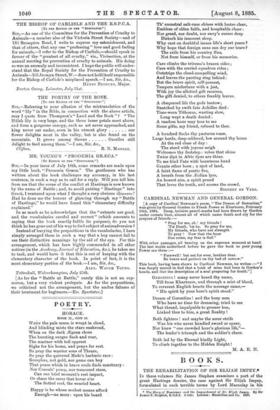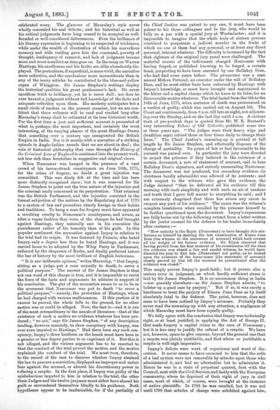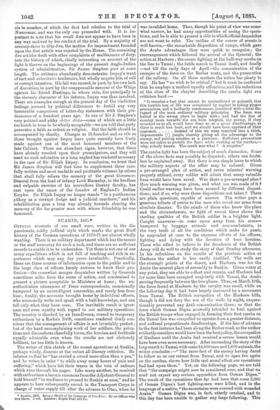BOOKS.
THE REHABILITATION OF SIR ELIJAH IMPEY.* IN these volumes Sir James Stephen examines a part of the great Hastings dossier, the case against Sir Elijah Impey, formulated in such terrible terms by Lord Macaulay in his
* The Story of Nweemnar and the Impeachment of Sir Elijah Impey. By Sir James F. Stephen, K.C.B.I. 2 vols. London : Macmillan and Co. 1885. celebrated essay. The glamour of Macaulay's style never wholly concealed his real defects ; and his historical as well as his critical judgments have long ceased to be accepted as well- founded or well-considered deliverances. Even the brilliance of his literary expression is beginning to be suspected of trickiness, whila under the wealth of illustration of which his marvellous memory and wide reading gave him the command, poverty of thought, inadequacy of research, and lack of judgment become more and more manifest as time goes on. In the essay on Warren Hastings, his excellences and his faults are alike abundantly dis- played. The portraiture, if superficial, is more vivid, the narrative more seductive, and the conclusions more inconsiderate than in any of the many articles he contributed to the blue-and-yellow organ of Whiggism. Sir James Stephen's writings display the historical qualities his great predecessor's lack. He never sacrifices truth to brilliancy, yet he is never dull ; nor does he ever hazard a judgment without full knowledge of the facts and adequate reflection upon them. His modesty anticipates but a small circle of readers on the present occasion, but we are con- fident that these volumes will be read and studied long after Macaulay's essay shall be estimated at its true historical worth. For the first time a just and sufficient account is presented of what is, perhaps, the most important, and certainly the most interesting, of the varying phases of the great Hastings drama that something over a century ago inaugurated the British Empire in India. Nor is it merely with a narrative of a striking episode in Anglo-Indian annals that we are about to deal ; the vein of historical philosophy that runs through the History of the Criminal Law of England is continued into the present work, not less rich than heretofore in suggestive and original views.
When Nuncomar was hanged in the presence of a vast crowd of his terror-struck countrymen on June 16th, 1775, for the crime of forgery, no doubt a great injustice was committed. This was dimly felt at the time and has been more distinctly recognised since ; but it was reserved for Sir James Stephen to point out the true nature of the injustice and the criminal really concerned in its perpetration. That criminal was the British Parliament, and the injustice consisted in the formal subjection of the natives by the Regulating Act of 1773 to a system of law and procedure utterly foreign to their habits and traditions. To hang a man for forgery must have appeared a revolting cruelty to Nuncomar's countrymen, and aware, as after a vague fashion they were, of the charges he had brought against Hastings, they naturally saw in his execution the punishment rather of his temerity than of his guilt. In this popular sentiment the accusation against Impey in relation to the trial had its origin. It was fostered by Francis, who hated Impey only a degree less than be hated Hastings, and it was carried home to be adopted by the Whig Party in Parliament, enforced by the eloquence of Burke, and finally preferred before the bar of history by the most brilliant of English historians.
"It is our deliberate opinion," writes Macaulay, "that Impey, sitting as a judge, put a man unjustly to death, to serve a political purpose." The answer of Sir James Stephen is that not one word of this charge is true, and it is impossible to resist the force of the facts and arguments he adduces in support of his conclusion. The gist of the accusation seems to us to lie in the averment that Nuncomar was put to death "to serve a political purpose,"—namely, the protection of Hastings, whom he had charged with various malfeasances. If this portion of it cannot be proved, the whole falls to the ground, for no other motive was or could be alleged. Now, the fact is—and it is one of the most extraordinary in the annals of literature—that of the existence of such a motive no evidence whatever has been pro- duced; "no act," says Sir James Stephen, "of any description tending, however remotely, to show conspiracy with Impey, was ever even imputed to Hastings." Had there been any such con- spiracy, Impey's three brethren on the bench must have been in a greater or less degree parties to or cognisant of it. But this is not alleged, and the vicious argument has to be resorted to that the conduct of the trial proved the motive, and the motive explained ,the conduct of the trial. We must turn, therefore, to the record of the case to discover whether Impey strained the law to procure a conviction, displayed an improper and unfair bias against the accused, or abused his discretionary power in refusing a respite. In the first place, if Impey was guilty of the misbehaviour imputed to him in relation to the trial, the other three Judges and the twelve jurymen must either have shared his guilt or surrendered themselves blindly to his guidance. Both hypotheses appear to be inadmissible, for if the partiality of
the Chief Justice was patent to any one, it must have been patent to his three colleagues and to the jury, who would be fully on a par with a special jury at Westminster ; and it is impossible to imagine that the whole body of sixteen persons combined to perpetrate a judicial murder in the fruits of which no one of them had any personal, or at least any direct personal, interest whatever. The difficulty is increased by the fact that eighteen of the original jury panel were challenged. The material counts of the indictment charged Nuncomar with having forged, or published knowing to be forged, a certain bond, purporting to have been executed by one Bollakey Doss, who had died some years befoie. The prosecutor was a man named Mohan Persand, an executor under the will of Bollakey Doss, and he must either have been suborned by Hastings with Impey's knowledge, or must have brought and maintained to the bitter end a capital charge which he knew to be false, for no discoverable motive whatever. The trial lasted from the 9th to the- 16th of June, 1775, when sentence of death was pronounced on a verdict of guilty, which was carried out on August 5th. The Court sat continuously, from 8 a.m. till late at night, not adjourn- ing over the Sunday, and on the last day until 4 a.m. A curious
trait of pre-punkah days is quoted from Mr. W. E. Busteed's very interesting Echoes of Old Calcutta, published some two-
or three years ago. "The judges wore their heavy wigs and (tradition says) retired three or four times daily to change their linen." The Chief Justice's summing-up is printed at full length by Sir James Stephen, and effectually disposes of the charge of partiality. No point of law or fact favourable to the accused was passed over. In particular the jury were directed to acquit the prisoner if they believed in the existence of a certain document, a sort of statement of account, said to bear Bollakey Doss's signature, and entirely exonerating Nuncomar. The document was not produced, but secondary evidence (in strictness hardly admissible) was allowed of its contents ; and with respect to the witness who gave this evidence, the- Judge declared "that he delivered all his evidence till thin morning with such simplicity and with such an air of candour- and truth that I gave full assent to everything he said ; and I am extremely chagrined that there has arisen any cause to suspect any part of his evidence." The cause was the witness's complete breakdown when recalled by the prisoner himself to be further questioned upon the document. Impey's expressions are fully borne out by the following extract from a letter written by the junior counsel for the defence to his leader immediately after sentence :—
"How unlucky is the Rajah (Noncomar) to have brought this mis- fortune on himself by desiring the last examination of Kissen Juan Doss (the witness to the statement of account) which bath overset all the weight of his former evidence. Sir Elijah observed that having proved from the first moment of his examination till the time the evidence was closed a fair and candid witness, he would have directed the jury to find him (Nuncomar) not guilty, as he looked upon the existence of the karar-nama (the statement of account). clearly proved by him till the moment he prevaricated after the- evidence was closed."
This amply proves Impey's good-faith ; but it proves also a serious error in judgment, on which hardly sufficient stress in laid by Sir James Stephen. It is no uncommon thing in India —nor possibly elsewhere—as Sir James Stephen admits, "to bolster up a good case by perjury." But if so, it was surely a harshness to treat the perjury of Kissen Juan Doss as by itself absolutely fatal to the defence. The point, however, does not seem to have been noticed by Impey's accusers. Probably they never read the summing-up with any attention, a negligence of which Macaulay must have been equally guilty.
We fully agree with the conclusion that Impey was technically right, or at least justified, in applying the Act of George IL that made forgery a capital crime to the case of Nuncomar ; but it is less easy to justify the refusal of a respite. We have not, however, space to give reasons, beyond the general one that a respite was plainly justifiable, and that where so justifiable a respite is well-nigh imperative.
Impey's defects were want of experience and want of dis- cretion. It never seems to have occurred to him that the evils of a bad system were not removable by attacks upon those who- administered it, and had no alternative but to administer it. Hence he was in a state of perpetual quarrel, first with the Council, next with the Civil Service, and lastlywith the European community, whom he deprived of their right of jury in civil- cases, most of which, of course, were brought at the instance of native plaintiffs. In 1782 he was recalled, but it was not
until 1788 that articles of charge were exhibited against him, six in number, of which the first had relation to the trial of Nuncomar, and was the only one proceeded *ith. It is im- portant to note that his recall does not appear to have been in any way motived by his conclazt of the trial. By a majority of seventy-three to fifty-five, the motion for impeachment founded upon the first article was rejected by the House. The remaining five articles dealt with other complaints of malfeasance of duty, into the history of which, chiefly interesting on account of the light it throws on the beginnings of the present Anglo-Indian system of administration, Sir James Stephen goes at some length. The evidence abundantly demonstrates Impey's want of tact and autoritaire tendencies, but wholly acquits him of evil or corrupt intention. His fall was caused, in part, by his own lack of discretion, in part by the unappeasable rancour of the Whigs against his friend Hastings, in whose ruin, due principally to the slovenly character of his defence, Impey was thus involved. There are examples enough at the present day of the vindictive feelings aroused by political differences to forbid any very favourable comparison of latter-day statesmen with their pre- decessors of a hundred years ago. In one of Sir J. Stephen's very pointed and pithy °biter dicta—some of which are a little too harsh in tone to be wholly acceptable—we are told that party generates a faith as ardent as religion. But the faith should be accompanied by charity. Charges as ill-founded and as vile as those brought against Impey have quite recently been freely made against one of the most honoured members of the late Cabinet. There are abundant signs, however, that these have already recoiled upon their promulgators, and they will need no such refutation as a long neglect has rendered necessary in the case of Sir Elijah Impey. In conclusion, we trust that Sir James Stephen will find time to supplement these care- fully written and most readable and profitable volumes by others that shall fully relieve the memory of the great Governor- General from the load of infamy Lord Macaulay, in the heedless and culpable exercise of his marvellous literary faculty, has cast upon the name of the founder of England's Indian Empire. Sir Elijah Impey no longer stands "in a posthumous pillory as a corrupt Judge and a judicial murderer," and his rehabilitation goes a long way already towards clearing the memory of the far greater man with whose friendship he was honoured.




































 Previous page
Previous page